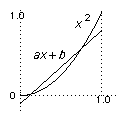
[d2(x , ax + b)]2=
 (x2 - (ax + b)2dx =
(x2 - (ax + b)2dx =  (x4 - 2x2(ax + b) + (ax + b)2) dx = 1/5 - 2/4a -2/3 b + 1/3 a2 + ab + b2. The minimum value of this is where d/da = 0 and d/db = 0. That is where -1/2 + 2/3a + b = 0 and -2/3 + a + 2b = 0 ⇒ 4a + 6b = 3, 3a + 6b = 2 ⇒ a = 1, b = -1/6. So the best-fit linear approximation to x2 is x - 1/6.
(x4 - 2x2(ax + b) + (ax + b)2) dx = 1/5 - 2/4a -2/3 b + 1/3 a2 + ab + b2. The minimum value of this is where d/da = 0 and d/db = 0. That is where -1/2 + 2/3a + b = 0 and -2/3 + a + 2b = 0 ⇒ 4a + 6b = 3, 3a + 6b = 2 ⇒ a = 1, b = -1/6. So the best-fit linear approximation to x2 is x - 1/6.
 n be the partial sum of
n be the partial sum of  fi, assume that m > n and look at d∞(
fi, assume that m > n and look at d∞( m-
m-  n) = max { |fn+1(x) + ... + fm(x)| for x ∈ [a, b]} ≤ max {|fn+1(x)| + ... + |fm(x)| } ≤ Mn+1+ ... + Mm.
n) = max { |fn+1(x) + ... + fm(x)| for x ∈ [a, b]} ≤ max {|fn+1(x)| + ... + |fm(x)| } ≤ Mn+1+ ... + Mm.Since the series
 Mi converges, its partial sums form a Cauchy sequence and so Mn+1+ ... + Mm is small for large m, n. Thus (
Mi converges, its partial sums form a Cauchy sequence and so Mn+1+ ... + Mm is small for large m, n. Thus ( n) is a Cauchy sequence in C[a, b] and since this is a complete space under d∞ the sequence is convergent to its pointwise limit and this limit is continuous.
n) is a Cauchy sequence in C[a, b] and since this is a complete space under d∞ the sequence is convergent to its pointwise limit and this limit is continuous.
Since |sin2(x)| ≤ 1, we may take Mn= 1/n2 and so by the Weierstrass M-test, the series
 sin2(x)/n2 is uniformly convergent to a continuous function.
sin2(x)/n2 is uniformly convergent to a continuous function. Deciding exactly where this function is differentiable is much harder.

Similarly, since |cos(anx)| ≤ 1, if 0 < b < 1 we may take Mn= 1/bn and use the fact that
 Mn is convergent to deduce that Weierstrass's function is continuous.
Mn is convergent to deduce that Weierstrass's function is continuous.Proving that this function is not differentiable anywhere is the hard bit!

So suppose that 2r divides m - n and that 2s divides n - q. Then m - q = (m - n) + (n - q) and so if t = min{r, s} we have 2t divides n - q. But 1/2t≤ 1/2r+ 1/2s since t is either r or s. Hence the triangle inequality holds.

If an= 1/2n-1 then d(an, 0) = 1/2n-1 and so (an)→ 0 in this metric.

One can define similar metrics for any odd prime in a similar way. This gives rise to some interesting algebraic objects called the p-adic integers which arise in a wide variety of applications.